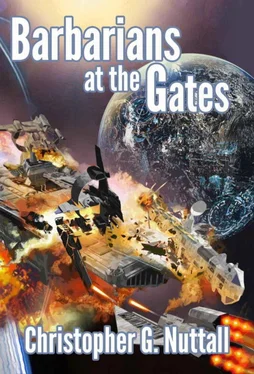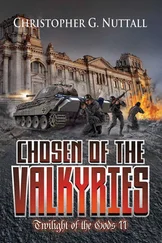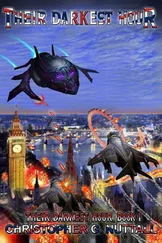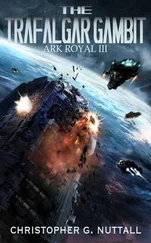He sat back and watched as the enemy ships started to pick up speed, running through the vectors in his head. Unless the starfighters could delay them, they’d escape without needing to engage the newcomers, even in a long-range missile duel. And yet, there was almost no way to prevent the starfighters from engaging them…was there?
“Launch a spread of antimatter missiles,” he ordered. Shipkillers were never spent on starfighters; everyone knew that. And if they were lucky, the enemy starfighters wouldn’t recognize the threat. “Detonate them at closest approach to the enemy craft.”
“Aye, sir,” the tactical officer said.
Roman watched the results grimly. Only a handful of enemy craft were destroyed in the blasts—antimatter detonations were tiny in the vacuum of space—but the remainder scattered, convinced they were fighting madmen. The tactic wasn’t normally considered to be reliable, if only because it expended too many missiles, weakening the cruiser if she encountered another starship. And as long as starfighters were scattered, the threat they posed was greatly reduced.
“Sir…?”
“Keep us on course,” Roman ordered harshly. They couldn’t fight the enemy ships in a straight battle. “Once we cross the mass limit, take us into FTL and aim us towards the first waypoint.”
“Aye, sir,” the helmsman said.
Two hours later, with the enemy having given up the chase, Midway and her consorts crossed the mass limit and vanished from the Marx System. They left behind nothing but chaos.
“The Enemy of My Enemy is My Friend” is a common truism. Like many other truisms, it is true only as far as it goes. In reality, the truism might read better as, “The enemy of my enemy is my enemy’s enemy,” as a shared enmity does not automatically translate to shared interests, let alone friendship.
-
Sayings of the Federation Marine Corps , 3757.
Jefferson System/The Hive System/Tranter System, 4095
The benefit to having access to an Asimov Point nexus, Captain Caitlin Bowery reminded herself as armoured Marines escorted her through the drop tube into Admiral Justinian’s private habitat, was that it gave the defenders the advantage of interior lines. Admiral Justinian could shift his forces to intercept any Federation thrust into his territory, even if the Federation managed to discover a previously undetected Asimov Point along the Rim that led into civilized space. It had allowed him to pull back most of his fighting units into Jefferson and prepare them for the grand offensive that would take him into the heart of the Federation, once the new units were built, crewed and worked up to fighting trim.
She allowed herself a smile as she passed through a series of airlocks, each one reinforced with a force field capable of standing off a nuclear warhead at point-blank range. All over the Harmony Sector, Admiral Justinian’s recruiters were enlisting young men and women into the armed force that would eventually break through to Earth. There was no longer any need for the artificial restrictions of Luna Academy, nor was there any need to discourage mustangs from rising to commissioned ranks, not when the entire social order was being turned upside down. Admiral Justinian—soon to be Emperor Justinian—had made the colonies certain promises. Once he was Emperor, the economic rape of their worlds by the Core Worlds would come to an end. The restructured Senate would recognize the out-worlds, like Harmony and Jefferson, as equal to Earth or Terra Nova. And the colonists had responded to his words.
“Captain Bowery, here to see the admiral,” one of her escorts said as they reached the final airlock. Admiral Justinian had become more than a little paranoid after the failure of his first and second attempts to break through into Federation-held space. He’d moved his headquarters to Jefferson—leaving his wife and daughters on Harmony, apart from the poor bitch who was being married off to seal a treaty between the admiral and another warlord—and started insisting on strict security. Caitlin had been strip-searched before she’d been allowed through the security cordon—and she was his most trusted associate. Very few people were allowed to see the admiral in person. “She’s clean, sir.”
There was a long pause. Caitlin had a moment to wonder if the security teams would insist on searching her again, or sending her in to visit the admiral minus her clothes and personal terminal, before the hatch hissed open and allowed her access. The Marines inside the hatch waved her in and pointed her to a more standard airlock at the end of a metal corridor. The entire complex was silent, so silent that she could hear her footsteps as she walked down the hallway and keyed the entry coder. There was a brief pause, then the airlock clicked open, allowing her into the admiral’s presence.
“Captain Bowery reporting as ordered, sir,” she said.
The admiral looked dreadful, his face pale and tired. She had only a moment to realize that something was wrong before he picked up a bottle and offered her a swig. He actually meant for her to drink straight out of the bottle.
“Sir…?” Caitlin had no idea what he was thinking, or even if he was thinking at all. It felt as if she were about to be called on the carpet for some imagined offense, yet if he’d doubted her loyalty she would never have been allowed to meet with him in person.
“Sit down,” Admiral Justinian said. His voice was bleak, yet coldly determined and fixed on something. “The forces in the Marx System were attacked.”
Only the ease of long practice kept Caitlin’s face blank. The Marx System should have been effectively impregnable, if only because of the long distance between the Federation loyalists and Admiral Justinian’s flank. A starship under stardrive from the nearest Federation-held star system would take—she checked her implants to be sure that the answer was right—over two years to reach Marx. The implications were not encouraging. No pirate or mercenary company would dare tangle with warships if it could be avoided. There was no profit in having one’s ships blown out of space.
The conclusion was inescapable.
“Governor Hartkopf has turned on us.”
“So it would appear,” Justinian agreed. He took a long swig from the bottle and sat back in his chair. Caitlin scowled at the display, wondering when her commander had turned to drink. He’d never shown any desire to drink himself senseless before. “And Henrietta is missing.”
Caitlin listened to the remainder of the story silently. The ships that had attacked the cruisers at Marx had used Admiral Justinian’s codes—the ones issued to his Foreign Secretary—to lure the cruisers away from the covering fire of the Asimov Point fortresses. That in itself had disturbing implications. The Foreign Secretary had either been taken prisoner and interrogated, or he’d turned his coat. Either way, the admiral’s daughter was in enemy hands, and all hell was about to break loose.
It had taken weeks of persuasion for his wife—Millicent Beauregard-Justinian, a woman whose ambition far outstripped her husband’s—to convince him to allow his daughter to be used to seal the treaty. And now it looked as if he’d sent her into enemy hands. The young girl didn’t know anything that could be used against her father, but her mere presence would be used against him. Caitlin forced herself to think coldly and rationally.
“Hartkopf isn’t insane,” she pointed out. “He may have convinced himself that we will let it pass, but his subordinates have to know better. I think he might have come to an agreement with the Federation to safeguard his life, in exchange for using his territory as a base. They could have moved a fleet up into his sector and pushed him into launching an attack on us.”
Читать дальше












